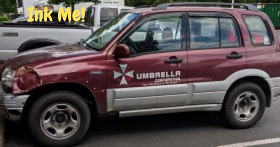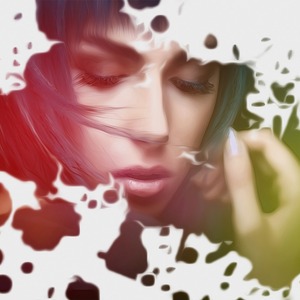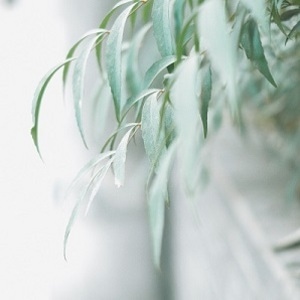"Mom, why do willows weep?"
Looking at my sixteen-year-old daughter, I wonder if she's a four-year-old in disguise. This isn't the first time she's asked an odd question out of the blue. Maybe not so blue, given we are walking in the park, and I remember there's a willow at the river's edge, visible from the bench we like to take a break at.
"They don't contain enough lignin in comparison to the hemicellulose in their branches to support them."
"Too much science mom. Tell me a story."
"Okay, a very long time ago, back before the Great Dying of the Permian - Triassic."
Interrupting me, she says, "Still too much science."
"Who's telling this? Way back before dinosaurs."
"Mom!"
"Good stories inevitably include some facts, and this one starts with large plants covering the land during the Carboniferous period. Now when the ancestor of the willow tree arrived, it didn't much resemble the willow tree we know today. It could move, generally not as fast as we do, but it moved. There were other differences too."
"Like a snail or a cheetah? I mean movement? Really Mom, plants that could move?"
"All plants could move then; all plants still move today, they're just slower now. You see flowers that open and close with the cycle of the day; plants turn their foliage to receive the most sun; it's why you have to keep turning a plant on a window sill, they move. They have always moved, but in the Carboniferous, they moved quickly. Back then, plants were closer to animals than they are today, though the animals had diverged from plants long before then."
"Okay, you've got no way of knowing that, but I like where you got the idea. You said there were other differences."
"Yes, and if you hadn't interrupted, I would have told you about them already." I'm snipping at her, and I don't mean to; she asked for a story, not another fight.
"Hump, you never get to the good parts fast enough."
"You asked about a plant. What on earth made you think this was going to be a quick story?"
"I just thought it might be a simple, quick story."
"Nothing is ever simple Lumi; you should know that much by now. Simple is what has gotten us this messed up society, this mentality of short-term profit over sustainability. This parasitic way of life that will lead to our extinction as a species. You're too young to have seen the original Cosmos done by Carl Sagan, but maybe you remember the remake done by Neil deGrasse Tyson. They both put ALL of human history as the last second of the last-minute on the clock of this planet's time. Shows how insignificant humans are in the grand scope of things, despite how high and mighty we like to think of ourselves… We are in a great extinction now; the Holocene, or Anthropocene extinction. Humans are the cause of it. Did you know that?" I hadn't intended to lecture her, but here I was doing it again.
"I had read something about it, but didn't know it had a name; I thought extinctions happened fast."
"No, that's an illusion perpetuated by science and the media. They name an extinction event like it's a day. They never emphasize the fact that extinctions happen over millions of years, not days or weeks. Even the fastest one, the K-T Boundary, didn't happen in a week, it took thousands of years. This extinction may be happening faster than the dinosaurs', but it will still take thousands of years and may not end until Humans have killed everything but themselves. Humans don't comprehend that amount of time well; not surprising given we only live a hundred years, if that."
"I never considered that. The Ordovician - Silurian, the Late Devonian, the Great Dying of the Permian - Triassic, the Triassic - Jurassic, the dinosaurs died off in the Cretaceous - Tertiary, I thought they were all a matter of a few years at most, not thousands or millions of years." She is showing off her big words; this is better than her taking offense, as she so often does when I try teaching her, and especially when I lecture her.
"Nothing is ever as simple as it appears. What people choose to emphasize can hide facts they don't want you to consider. Remember that. You know the names of the geologic periods, the major extinctions, and how long ago they happened, but you don't know how long they actually took and good luck finding that information. Perception is everything."
"Give me a better example Mom."
"A better example? Don't you mean a different example? Be concise with your language; better is a biased perception of quality." Again, I am correcting her language. Something my mother did for me. She resents it with equal intensity.
"Mom!"
"Sorry. Do you remember a news report a few years back about kids not knowing where eggs came from?"
"I remember saying they were stupid, and you told me their parents probably didn't know either. I laughed when some of them said the grocery store."
"Perception and marketing. It’s called an egg instead of a chicken ovum. Another food example is bacon or even pork. No one calls it pig because of marketing. The name pig is associated with a dirty animal living in filth, not something you would want to eat. Pig is also used in a derogatory manner to describe a morbidly obese person, not something you want to become. These associations hurt the sales of pig meat, so some bright person decided if they changed the name, they could lose the association. With the conversion of the society from agricultural to industrial, it worked. People didn't grow up knowing where their food came from, and never questioned the indoctrination by the media and marketing."
We have reached our bench, without an outright fight. She plops down in a distracted manner. I can almost see the gears turning in Lumi's head as she correlates this information, making new associations, changing her perspective. I've tried to get her to question what she assimilates, to even perceive she is being indoctrinated. She has enough confidence in herself to question the world around her, and a knowledge base large enough to see the inconsistencies. Will she, though? I've encouraged her curiosity regardless of its direction. Her interest in bugs had been a relief after the beauty pageant phase. I hadn't liked either of them, but I hadn't let my feelings influence her interests. Lately, it doesn't seem to matter what I say; it starts a fight. Both of our tempers have grown so short. I look at the weeping willow and wonder if I have gotten too old, too inflexible, too set in my perspective to be useful, or even relevant to my daughters continued growth.
"Mom, can we go back to the willows' story?"
"Yes, we can if you like. Where was I?" My dark musings have caused me to lose my place in the narrative.
"You were telling me about how the willows’ ancestors were different."
"And you wanted a short story, not facts. How about a fantasy?"
"That would be nice." Her impish grin is back.
"Okay, a short fantasy about why the willow weeps." I pause to point my thoughts in a new direction and begin.
"A very, very long time ago, when the earth was new, Mother Nature looked at her world with speculation. It was a harsh world of stark contrasts. It was too sharp; it grated on her senses. This wouldn't do, so she set out to transform it into something softer, more pleasing to her. Setting the weather in motion, she turned away to find her toolbox of creation. When she turned back, much of the sharp harshness was gone, in fact, most of the definition was gone. Her world was on the verge of becoming a smooth ball of water. That wouldn't do either. She set the land moving, pushed volcanoes from the ocean's floor and separated the one ocean into many. That was better, more physical variety, but still missing color variety. She pulled the missing colors from her box and spread them around; the first life had begun. Next, she pawed through her box for the shaping tools. Taking hold of the simple life, she transformed it into the first plants and animals, giving both many forms and functions. Having provided the environment an ever-changing nature, she gives this ability to all she creates. For reproduction, she split her creations into male and female, though not all of them; some she makes hermaphroditic, and some she gives a form of cloning to. It was tiring work coming up with all these different things. As Mother Nature was dozing off, she wondered what her creations would do with the gifts she had given them." I sip some water before continuing.
"While she slept, her creations changed. Some got stronger and destroyed any they came across weaker than them. Others refused to adapt and died out. Some banded together and formed communities that supported each other. Plants, animals, and the environment working toward mutual support; changing in ways that made them more dependent on each other. Willows' ancestors were in the first group, rather than the last. These ancestors didn't resemble our present willow in the least. They were towering, sturdy trees with inflexible thorny branches and poison. They had eliminated everything on their little island. Encountering nothing more to fight, they became sedentary and lost most of their ability to move. When Mother Nature awoke, she was curious to see how her creations had changed. She mourned the loss of those who had refused to adapt and was pleased to follow the evolution of those who had formed interconnected communities. Then, she came across the small island that willows' ancestors had been isolated on. None of her other creations had been so greedy as to destroy everything in their vicinity. She noted the island had broken away from its Continent of origin in an attempt to purge this destructive force."
"Mom, are you turning this into a moral story?"
"Not intentionally; though now that you mention it, I suppose if you look at it in a certain way it could be."
"Ugh, will you ever stop trying to turn everything into a lesson?"
I look at my daughter in shock. Is that how she perceives me? Just another know it all teacher? That implies I think she's stupid. How did that happen? I know she's intelligent, and I thought, I was doing a good job of giving her a positive self-image.
"Lumi, I wasn't trying to make it a lesson. I needed a reason for the willow to regret so that it could weep. It's a short story, so the reason needed to be obvious."
"Oh." She sounds defeated.
"Do you want me to continue the story?"
"Yes, it's more intriguing than I thought it would be."
"Carefully, Mother Nature changed willows' ancestors. She turned the thorns into thin, narrow leaves, but she left the poison. In a sad voice, she told the ancestors she had removed their ability to make thorns; they could still change in other ways, but they would never again inject their poison into anything. Some of the ancestors saw a single tear slide down Mother Nature’s face as she left the island. Willows' ancestors were left with a deadly problem. With no way to eject the buildup of poison, it started eating away at the bodies that contained it, destroying willows' ancestors from within. Most of the ancestors were too angry about the loss of their thorns to notice, much less care about the destruction of their tissues. One by one they passed from life to death. This wasn't the case for all the ancestors, a few had seen the tear, and it meant more to them than their thorns had. The poison built up in their bodies just as it had in the other ancestors, but they chose to use the gift Mother Nature had left them; the option to change. Changing the poison took a long time. Its effects couldn’t be mitigated during the process because the destroyed tissue provided the means for changing the poison into something altogether different, something useful. When it was done, most of the willows' branches hung down, its leaves whispering in the wind. The ancestor thought it was an advantageous trade; it didn't resemble the rigid spiky tree it had been, and it had something useful to offer Mother Nature."
"That doesn't sound like the tree is going to be weeping, but it’s a neat explanation for the drooping limbs."
"Thank you. Shall I conclude the story?"
"Of course, I want to know what willows' ancestor made."
"Willow moved his drooping branches in the breeze, making a soft melody. The sound carried to where Mother Nature sat making minor changes, finishing correcting the development of those who had only gone slightly astray. Intrigued, she followed the sound to the island willows' ancestors had occupied. Instead of the barren rock she had expected to find here, she found a graceful tree making gentle music. Mother Nature placed her hand on the trunk and learned the changes that had occurred in her absence. Willow saw the swollen knuckles Mother Nature had acquired in her long toil. The ancestors' gift would be useful. Willow gave Mother Nature some of his bark and directed her to make a tea to alleviate the pain of her joints; she did and settled against willows' trunk as her pain dissipated. Mother Nature called him Weeping Willow and asked for him to make the soothing melody again; she wanted to drift off listening to it. Weeping Willow asked the wind to help him play for Mother Nature as she drifted off into a much-deserved slumber."
"So weeping willows didn't weep, they changed because Mother Nature wept, and what the ancestor made was a pain reliever?"
"Yes, and yes. I did stick some science in; it fit where the story was going. Willow trees are the initial source of salicylic acid; aspirin in plain English."
"I didn't know that."
We sit in silence, contemplating the weeping willow when it occurs to me, I may retain one more relevant bit of knowledge to pass on to her.
"Do you know what your name means?"
"Yeah, snow." She sounds dejected.
"I have one last personal example of perception for you. Lumi only means snow in the Finnish language. I didn't know about that when I named you. Your name has another meaning, the one I chose it for. It comes from Latin, not Finnish. It means the light of life."
"I thought my name was some obtuse joke about my birth signaling the beginning of the winter of your life. Your subtle way of letting me know you resented me."
"Lumi, I never resented you. You're my bright light." I move to hug her and am stunned to find her crying.
"I never understood why you called me that. It finally makes sense." She says between sniffles.
I hold her close while she releases this bitterness she has carried inside for too long. I should have told her sooner. I didn't know. Perception is everything.














Comments (6)
See all